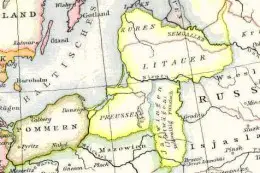The Prussian language became extinct at the start of the 18th century. It was closely related to Lithuanian, Latvian and Polish. The Prussians were ethnically related to the Latvians and Lithuanians before the German people settled in the area. The Poles did once live in the Eastern and Western part of Prussia, though Polish is a Slavic language that is closely related to Ukrainian, Russian and Belrusian. Prussian was first written down during the 13th century. It was written using the Latin alphabet. A few written literature in the language have survived up to date.
Prussian is an IndoEuropean language that falls under the Baltic group of languages. The Baltic group of languages is closest to the Slavic group of languages. The Slavic and Germanic group of languages are in turn closely related to the Germanic group of languages. Baltic languages are divided into Western or Peripheral Baltic and Eastern or Central Baltic. Prussian falls under the Western Baltic languages. Lithuanian and Latvian are Eastern Baltic languages. The Prussian language is much older than the Eastern Baltic languages. Prussian was also closely related to other Western Baltic languages that are now extinct. This included the Galindian, Sudovian and Curonian languages. Prussian had loan words from Slavic languages. It also had loan words from German.
Old Prussian was once spoken by the people of Prussia. Prussia should not be confused with the German state that had the same name. Prussia then is now the present day north eastern part of Poland and the Kalinigrad Oblast in Russia. Due to the coming of German colonialists and the migration of people from other countries such as Poland, Scotland, England, France, Austria and Lithuania into Prussia, the Prussian language fell out of popular use and the German language, which was the language of the German government in Prussian became more popular. The migration of people from other countries into Prussia was caused by the Protestant Reformation that was taking place at that time. Also, due to the various plagues that affected the Prussian countryside during 1709 to 1711, most native Prussian speakers died. This included the bubonic plague epidemic and famines that affected the area.
